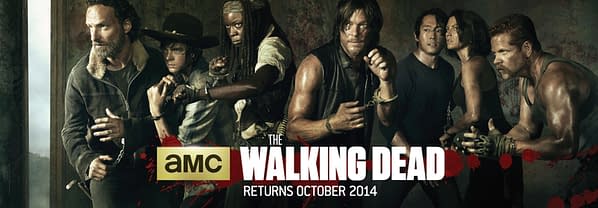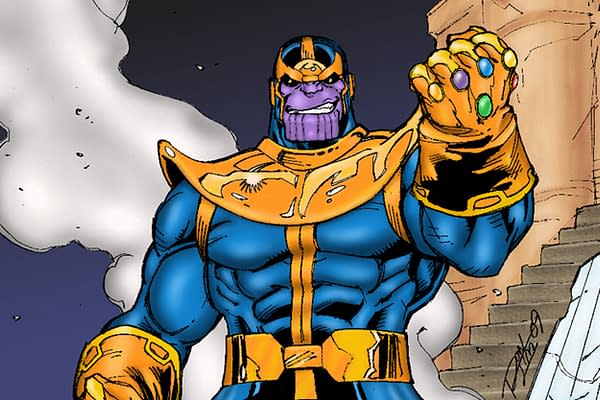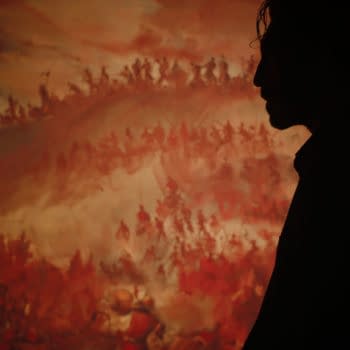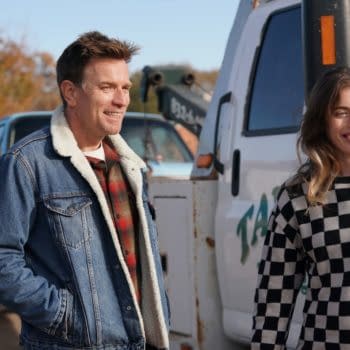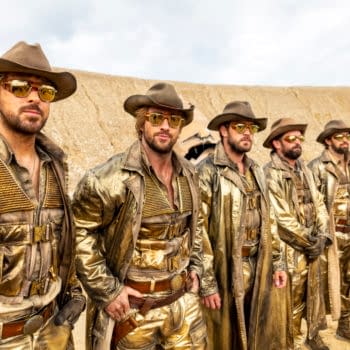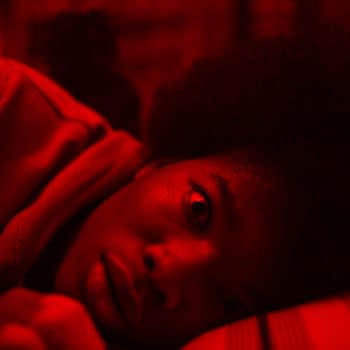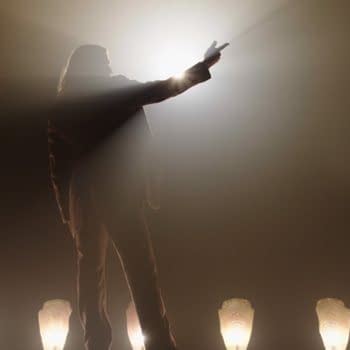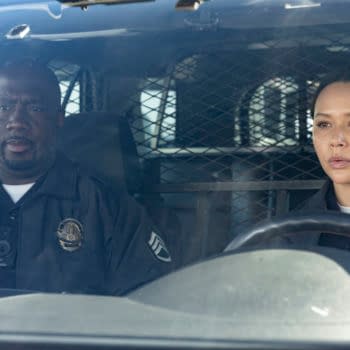Posted in: Movies, TV | Tagged: entertainment, Sigmund Freud, Terminus, Thanatos, thanos, The Walking Dead, tv
Erik's Weekly Watch – Rick, Sigmund Freud, And Thanatos Walk Into A Discussion About The Walking Dead
By Erik Grove
Welcome back to another edition of Erik's Weekly Watch! This week it's all about The Walking Dead, with cameos from one of history's most famous coke-fiends and the Greek personification of death!
This week AMC's The Walking Dead premiered its fifth season and a record-breaking audience tuned in. After five years of pop culture prominence, TWD shows no signs of slowing down or losing steam something that I'm certain would come as a surprise to most people from five years ago. If you parse the numbers (over 17 million people watched the premiere) you find that more people watched this episode than any single cable television network show ever, easily eclipsing even AMC's other critical darlings, Mad Men and Breaking Bad. The Walking Dead has become such a potent force that it credibly competes with Sunday Night Football, a far more expensive and, historically, more popular entertainment block. This all begs the question why? What makes The Walking Dead this popular? There are some obvious answers, some less obvious ones and some really interesting follow-up questions that this suggests.
I'm not going to spend a lot time reviewing the merits of Sunday's episode, "No Sanctuary." The premiere was a straight down the middle resolution to the fourth season's cliffhanger ending. There weren't many substantial surprises and there weren't many substantial disappointments in an hour of competent, engaging and well-paced television. The cast is solid, the guest actors are memorable and the entire production team is on point here. I've written before that I like The Walking Dead but I don't love it. In my estimation, the show is usually always good and rarely great or bad. The show's consistency is laudable and it stands head and shoulders above most television shows but, for me, I see the potential for something really outstanding that doesn't manifest. All this is to say that I don't think "No Sanctuary" was the best hour of television in cable television history and I'd be surprised if many people disagreed with me. There's something beyond pure craft that appeals to viewers of TWD. So, what is it?
That consistency of quality that I wrote about is a big part of what makes TWD a big hit, I think. While it's not the best hour of television ever, the writing, acting, directing and production are reliably stronger than most of its peers. Everyone involved with The Walking Dead is doing honest, good work and viewers notice that and become comfortable with it.
Another thing that seems to be an obvious takeaway for me about why audiences love the TWD so much is that even within its remarkable consistency it remains completely unpredictable. There's an omnipresent sense of danger and surprise waiting with every new installment. Main characters can and will be killed not just in season finales or heavily hyped event episodes. The name of the premiere can double as the name for the viewing experience; there's not going to be a sanctuary or tranquil ending for these characters. They are doomed to wander an abandoned apocalyptic landscape careening from tragedy to calamity and we, the audience, will be dragged along behind. This seems surprisingly fresh in a television landscape that dwells in familiar status quo and decompression. The side effect of this kind of storytelling is that there's an urgency to keep up with it. If you don't want to read the spoilers of the most recent mind-bending twist, you need to watch TWD when it airs or soon thereafter.
I suspect that there's something deeper to the audience connection with The Walking Dead beyond the sum of its parts though and I wonder if that deeper connection is our infrequently-used-in-modern-parlance Greek friend, Thanatos. In mythology, Thanatos is the personification of death and the counterpart of the personification of life, Eros. Noted literary and TV critic Sigmund Freud has suggested that people have a "life instinct" (Eros) and a "death drive" (Thanatos). Freud's idea is that even without outside stimulus people are drawn to self-destructive things and depictions of self-destructive things by instinct. Freud, as you know, was a cocaine-addled maniac but his concepts of the "life instinct" and "death drive" are useful to discuss the continuing bleak-ification of popular media.
It really isn't a revelation to point out that the most well-regarded television programs of the last few years have been obsessed with insanity, death and the inevitable descent of morality. I wrote about this recently when talking about Sons of Anarchy, but it seems to be very much on the minds of the creators of TWD, particularly this season. Crucial plot points in the premiere are entirely dependent on the constant, in the show externalized, conflict between the "life instinct" and the "death drive." To survive, the characters must challenge and compromise their own humanity. Compassion is either a tragically unattainable virtue in this world or a weakness.
This same struggle, either this overtly or more subtly, plays out across the dial and viewers are echoing it whether they know it or not. They're cheering for crime bosses Walter White, Jax Teller, and Nucky Thompson or the psycho-of-the-season on American Horror Story or they're hoping that baby or annoying kid gets killed. They want the darkest characters to reveal a glimpse of humanity and they want the humanity from everyone else to be ridiculed or obliterated; Eros and Thanatos battling it out in the Nielsen ratings. It's only in The Walking Dead that this central conflict is so perfectly personified. The most telling moment for me (and the coked up ghost of Freud) was when a character uses the entrails of zombies as camouflage to walk among them and shoot up some people. This is not a new device, characters have been slathering themselves up with dead goo since the first season to get past shambling zombies since the first season, but what is new that the character is clothing herself in death to become a more effective killer of the living.
So, The Walking Dead is well-constructed and it taps into themes that seem to be very prominent in our collective consciousness but all of this Freudian analysis leaves me with a bigger question: why are we so interested in death and exploring the impossibility or futility of compassion now? It's possible that these are just generally interesting questions in any age and its pure coincidence (and executives making calculated decisions) that we are seeing so much of it. It's also possible that there is something in the zeitgeist, some contemporary internal conflict that we're seeing play out on our TV screens and finding resonance with.
I don't know the answer and I'm sure it's really "both, and…" but what this climate reminds me of is a similar cycle in the late 1970s and early 1980s in film, an era that saw the dizzying critical accomplishment of The Godfather and a glut of low budget slasher films. Some film historians have suggested (in many cases confirmed in interviews by some of the filmmakers) that this era of increased gray areas and gore in films was a kind of social fallout for the end of the Vietnam War. Makeup artists were creating scenes of bloody mayhem that weren't just imaginary anymore; they were sometimes remembered from the graphic horror they had seen at war.
Here we are now, 13 years into the Global War on Terror and the images that are most seared on our minds are images of compromised morals and shocking inhumanity. Is there something of Abu Ghraib seeping into something as seemingly fantastic and escapist as The Walking Dead? Are the themes and struggles we see reflective of our own compromised compassion? All I know for sure is that in contrast with the grim and gritty films of the late 70's and early 80s we also got a new era of wonder in cinema led by visionaries like George Lucas and Steven Spielberg and I very much hope that we see something similar come out in popular culture to counterbalance all of this cynicism and dread.
Erik Grove is a writer living in Portland, Oregon. You can read his work at www.erikgrove.com and follow him on Twitter @erikgrove


